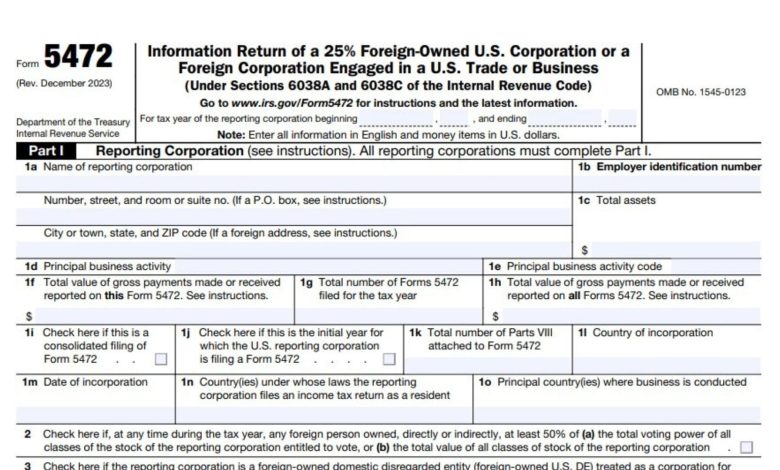
Understanding how to avoid the Form 5472 penalty is crucial for U.S. corporations with foreign ownership or foreign corporations engaged in a U.S. trade or business. This article serves as a comprehensive guide to navigating the complexities of IRS regulations regarding Form 5472, providing the steps you can take to ensure compliance and avoid the steep penalties associated with late or incorrect filings. Form 5472, “Information Return of a 25% Foreign-Owned U.S. Corporation or a Foreign Corporation Engaged in a U.S. Trade or Business,” is an informational return required by the IRS to track transactions between U.S. companies and their foreign counterparts. This form is essential for ensuring tax compliance and preventing transfer pricing manipulation.
- Who Must File: U.S. corporations that are at least 25% foreign-owned, and foreign corporations that conduct business in the U.S. must file Form 5472. This also includes foreign-owned U.S. disregarded entities with reportable transactions.
- Purpose: The IRS uses Form 5472 to examine the books and records of foreign parent corporations in order to effectively audit the transfer prices used by U.S. subsidiaries of foreign corporations.
- What to Report: The form requires disclosure of information regarding foreign shareholders, certain other related parties, and the dollar amounts of transactions with foreign related parties, including sales, rents, royalties, interest, and service payments. Nonmonetary transactions must also be reported, such as exchanges of services or property.
Penalties for Non-Compliance
Failure to file Form 5472 or filing it incorrectly can result in significant penalties.
- Base Penalty: The base penalty for failing to file Form 5472 on time is $25,000 per form.
- Additional Penalties: If the failure to file continues for more than 90 days after the IRS notifies the taxpayer, there is an additional penalty of $25,000 for every 30-day period (or fraction thereof) that the failure continues. There is no maximum limit on these penalties.
- Assessable Penalties: The IRS can assess these penalties without issuing a notice of deficiency and without providing a prepayment judicial forum to dispute the penalty.
- Extended Limitation Period: Failure to file Form 5472 can affect the limitation period under Section 6501(c)(8) of the IRC, potentially keeping the assessment period open indefinitely.
- Incorrect Filing: Penalties may also be incurred for incorrectly filing the form.

Key Steps to Avoid Form 5472 Penalties
To avoid incurring penalties when filing Form 5472, consider the following strategies:
- Engage a Competent Tax Professional: Selecting a tax professional experienced in preparing Form 5472s can significantly reduce errors and ensure timely filing. A qualified tax advisor can provide advice that constitutes reasonable cause for failure to file.
- Gather Necessary Information: Collect all required client information and documentation, including the legal name and address of the corporation, details of foreign owners, and details of financial and non-monetary transactions with related parties.
- Maintain Detailed Records: Keep accurate records of all transactions with related parties, including both monetary and non-monetary exchanges throughout the year. This includes invoices, contracts, and other supporting documentation.
- File on Time: Ensure that Form 5472 is filed by the due date of your income tax return. It is usually filed on the same day as Form 1120 (U.S. Corporation Income Tax Return) or Form 1120-F (U.S. Income Tax Return of a Foreign Corporation).
- File for an Extension: If needed, file for an extension using Form 7004 before the original due date.
- Double-Check Information: Before submitting the form, carefully review all entries for accuracy and completeness.
- Use Up-to-Date Forms: Always use the most recent version of Form 5472. The IRS frequently updates these forms, and using an outdated version may result in processing delays.
- Understand Related Party Definitions: Be sure you know who the IRS defines as a related party.
- Address IRS Queries Promptly: If the IRS queries Form 5472, respond to them as quickly as possible to avoid additional complications.
- Convert Foreign Currency: If transactions involve different currencies, convert the amounts to U.S. dollars using appropriate exchange rates.
Common Form 5472 Filing Mistakes
Many businesses make errors that can lead to penalties when filing Form 5472. Common mistakes include:
- Missing Fields: Not completing all required fields on the form.
- Incomplete Information: Failing to provide all the necessary details on the form.
- Incorrect Information: Providing inaccurate details such as incorrect names, addresses, or tax identification numbers.
- Missing Deadlines: Not filing the form by the required due date.
- Not Reporting Changes in Ownership: Failing to indicate changes in ownership during the tax year, such as acquisitions or sales of significant ownership interests.
- Failing to Report All Relevant Transactions: Omitting transactions with related parties, including non-monetary transactions.
- Not Including Supporting Documentation: Not including supporting documentation for the information reported on the form.
- Overlooking Non-monetary Transactions: Failing to report non-monetary transactions or transactions made for less than full consideration.

Defenses Against Form 5472 Penalties
If the IRS assesses a penalty, there are several defenses that may be used:
- Reasonable Cause: This is the most commonly cited defense. You must show that you acted with “reasonable cause” and without “willful neglect”.
- “Willful neglect” is defined as a conscious, intentional failure or reckless indifference.
- The IRS defines “reasonable cause” and lack of “willful neglect” as the taxpayer exercising “ordinary business care and prudence”.
- Examples of reasonable cause may include a return mailed on time but returned for insufficient postage, death or serious illness of the taxpayer, or erroneous information from an IRS official.
- Reliance on the advice of a qualified tax advisor may also constitute reasonable cause.
- Section 6751: This section of the Internal Revenue Code requires the IRS to follow certain procedures when imposing penalties.
- The IRS must provide notice of the penalty, the section of the code that imposes the penalty, and how it is computed.
- The “initial determination” to assess the penalty must be approved “in writing” by an “immediate supervisor” or an “approved higher official”.
- Failure to comply with Section 6751 can result in the removal of the penalty.
- Litigation: If other defenses fail, you can litigate a Form 5472 penalty by paying it in full and suing the government in a Federal district court or the U.S. Court of Federal Claims.
- You may also dispute the penalty in the United States Tax Court without having to prepay the penalty.
- Tax Court can review the IRS’s penalty assessment de novo, which means that the court can make its own independent finding of facts.
- You may also argue that the IRS abused its discretion in assessing the penalty.
- To contest a penalty through a Collection Due Process Hearing, you must wait for the IRS to issue a “Final Notice of Intent to Levy and Notice of Your Right to a Hearing” or “Notice of Federal Tax Lien Filing and Your Right to a Hearing” and then request a CDP within 30 days.
How to File Form 5472?
Form 5472 can be filed electronically or via mail.
- Electronic Filing: The IRS recommends filing electronically because it is easier, faster, and reduces paperwork.
- Mail: If filing by mail, include a copy of Form 5472 and Form 1120 (or Form 1120-F).
Conclusion
Avoiding penalties associated with Form 5472 requires a thorough understanding of filing requirements, maintaining accurate records, and careful attention to detail. By engaging qualified professionals, ensuring timely submissions, and carefully reviewing all information, businesses can effectively manage these complexities and stay compliant with IRS regulations. Additionally, being aware of potential defenses can provide recourse if a penalty is assessed.

FAQs
- What is Form 5472?
- It’s an informational return for certain foreign-owned U.S. corporations or foreign corporations doing business in the U.S..
- Who must file Form 5472?
- U.S. corporations that are at least 25% foreign-owned, foreign corporations engaged in U.S. trade or business, and foreign-owned U.S. disregarded entities with reportable transactions.
- What is the penalty for not filing Form 5472 on time?
- The base penalty is $25,000 per form, and it can increase by an additional $25,000 for each 30-day period the failure continues.
- What are common mistakes to avoid when filing Form 5472?
- Incomplete information, missing deadlines, and not reporting all relevant transactions are common mistakes.
- What are some defenses against a 5472 penalty?
- Reasonable cause, Section 6751 violations, and litigation are possible defenses.
- How can a tax professional help with Form 5472?
- They can provide expertise, reduce errors, and ensure timely filing.
- What transactions must be reported on Form 5472?
- Monetary transactions such as sales, rents, royalties, and interest payments, and non-monetary transactions, or transactions made for less than full consideration.
Related Keywords:
Form 5472, IRS, foreign-owned corporations, tax penalties, international tax, tax compliance, filing requirements, related party transactions, tax professional, accounting software, tax deductions, assessable penalties, reasonable cause, Section 6751, tax litigation, transfer pricing, U.S. trade or business.